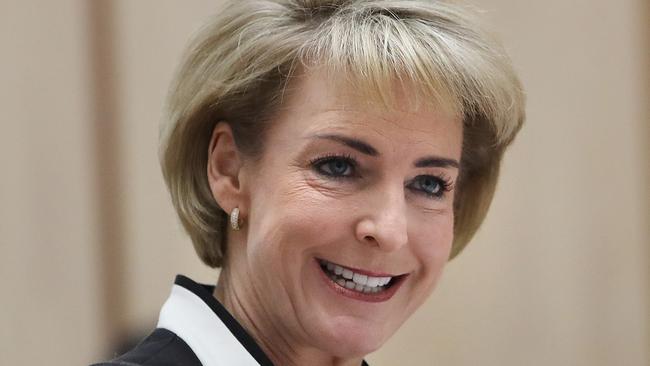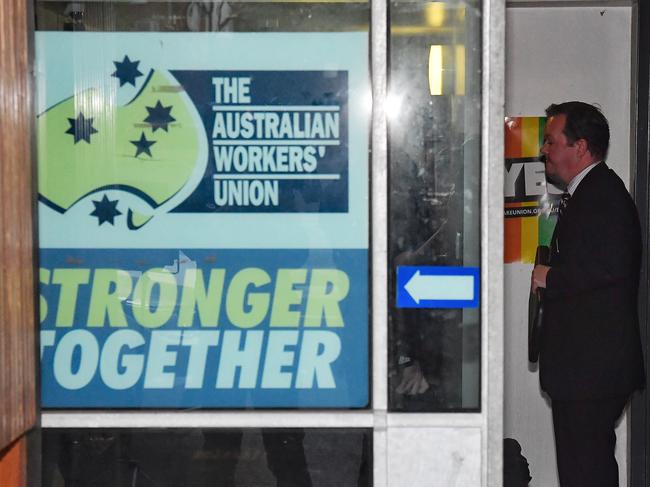The trouble with anti-union agendas
The AWU raids scandal complicates the Coalition’s fight against the ACTU.

Bill Shorten’s declaration the federal election will be a referendum on wages, and the ACTU bid to mobilise 250,000 workers in anti-Coalition protests on April 10, confirms Labor’s political and industrial wings want industrial relations to feature prominently in the upcoming campaign.
ACTU secretary Sally McManus is upfront that next month’s walkouts are political. They are designed to build momentum for a Labor victory rather than pressure the Opposition Leader to make new concessions to unions. McManus is satisfied the promises Shorten has already made will translate into an array of beneficial policy changes that unions could never achieve under Scott Morrison.
These dynamics means the Coalition will run hard with the claim that Shorten, the former union leader, will be captive to the union movement at the expense of the broader national interest. But the Prime Minister has a challenge with the personnel available to promote his anti-union message.
Prosecuting the government argument will be Jobs and Industrial Relations Minister Kelly O’Dwyer, who voters know is leaving parliament at the election. Her predecessor in the workplace relations portfolio, Craig Laundy, is reportedly also preparing to quit.
Michaelia Cash, the former employment minister, could talk underwater about industrial relations, delivering the Coalition script about how Shorten, McManus and the CFMEU will destroy the economy if Labor is elected.
But Cash, who played a significant role for Malcolm Turnbull in the 2016 campaign, has diminished political authority due to her handling of the long-running controversy over 2017 raids on Shorten’s former union, the Australian Workers Union.

Federal Court proceedings and Senate estimates hearings have combined to focus renewed scrutiny on Cash. And federal Labor will seek to keep the issue alive in the weeks to the election, exploiting the contradictory evidence that has emerged in civil proceedings brought by the AWU.
Court testimony by former Coalition staffers suggests someone is not telling the truth. Conflicting accounts, given under oath, of key conversations, cannot both be right. Here’s what we know.
Ben Davies, then chief of staff to Cash, was in his Parliament House office on October 24, 2017, when he took a call from Mark Lee, soon to join Cash’s staff as her senior media adviser.
Lee, who oversaw media strategy for the Fair Work Ombudsman and the Registered Organisations Commission, was ringing to finalise arrangements for his new job.
Davies says Lee shared confidential information with him, revealing the Australian Federal Police would in hours execute search warrants on behalf of the commission at the Sydney and Melbourne offices of the AWU.
Following two referrals from Cash, the supposedly independent commission had decided to investigate if AWU donations to activist group GetUp and three Labor candidates, made when Shorten was the union’s national secretary, had been properly authorised.
The alleged tip-off to Davies, which Lee sensationally denied under oath, set off a chain of events that, 16 months on, continues to damage Cash.
The court proceedings, where the union is seeking to kill off the commission investigation, and Senate estimates evidence about the police probe into the leaking of the AWU raids to the media, placed new pressure on Cash.
Lawyers for the AWU allege that Cash wanted to discredit, embarrass or politically disadvantage Shorten by referring the donations to the commission. The AWU referral was the only referral she made to the commission. Under cross-examination, Cash denied her conduct was politically motivated.
Davies says the alleged tip-off from Lee about the warrants had “obvious political implications”. He says Lee had told him in October 2017 that a “whistleblower” claimed the AWU was destroying documents
“The political implications were an obvious inference that there was evidence to suggest some kind of cover-up or document destruction to conceal evidence that may be unfavourable to Mr Shorten,” Davies says.
Forty minutes after their conversation, Davies called Cash’s then media adviser, David De Garis, into his office, told him about the warrants, and they agreed De Garis would tip off the media.
De Garis telephoned Michael Tetlow, a staffer with then justice minister Michael Keenan, and they decided De Garis would contact newspaper journalists and Tetlow would inform television reporters.
The action ensured television crews were present at the AWU offices when the warrants were executed. Questioned about De Garis’s sworn evidence, Keenan in parliament stood by his previous claim that none of his staff tipped off the media.
Davies agrees the presence of television crews during the raids was “of political detriment” to Shorten. De Garis says he took into account the impact on Shorten’s reputation. He admitted to later deleting text messages exchanged with Tetlow.
Registered Organisations Commission executive director Chris Enright acknowledges he was aware of Cash’s agenda. “Clearly, the minister was on a particular political side of parliament that had an agenda. I was clearly aware of that.”
Davies was Cash’s top political aide but he insists he did not tell her about the raids ahead of time. Cash says she became aware of them only when she saw them on television.
Until the court proceedings, De Garis was the only confirmed leaker. The passing of information from Davies to De Garis and then Tetlow had not been disclosed. Cash said when De Garis admitted to the leak and resigned, he told her he got the information from a “media source”, not Davies.
Cash says she asked all her other staff, presumably including Davies, whether they had advance knowledge of the execution of the warrants and the media being tipped off. They denied it. This information was part of her evidence to Senate estimates, meaning Davies could now be exposed to action for contempt of parliament.
It was expected Lee would provide the missing part of the leak narrative. Davies had named Lee in court and in his police statement as the source for his advance knowledge of the raids. The question was, who told Lee?
Lee confirms he had a meeting around midday on the day of the raids with a Registered Organisations Commission media officer, Greg Russo, who told him the commission was seeking to obtain search warrants in relation to the AWU investigation.
He says Russo said he was told by Enright that the application had been made because Enright had got a call that “something was happening with the evidence”.
Lee acknowledges he telephoned Davies, but he denies talking about the search warrants, directly contradicting the earlier evidence by Davies.
Both accounts, given under oath, cannot be true.
Lee flatly denies discussing the warrants with Davies during the phone call he said occurred at 1.30pm, three hours before the warrants were executed at the AWU. Davies said he did.
“I didn’t know when the raids (were) going to take place, I didn’t know the locations, I didn’t know that the warrants had been issued,” Lee told the court. “That couldn’t have come from me.”
Russo says Enright gave him the authority to speak to Lee about the potential for search warrants to be executed. He says he had an “in confidence” discussion with Lee and “mentioned there may be search warrants”.
Enright says, on the day of the raids, the AFP told him it proposed to brief Keenan’s office before question time, 2½ hours before the warrants were executed. Keenan has said his office was only told “immediately” before the raids. However, according to De Garis, Tetlow tipped off the media in the afternoon.
Meanwhile, AFP deputy commissioner Leanne Close told Senate estimates that Cash and Keenan had declined to provide witness statements to AFP investigators. She says the AFP sought statements from Cash and Keenan at least twice but they sent letters that the AFP said did not classify as witness statements.
“We wanted to have the opportunity to speak to them both and see if they could provide information to support our unauthorised disclosure investigation,” Close says.
The AFP sent a brief of evidence to the commonwealth Director of Public Prosecutions believing there was a prima facie case that a conviction for a crime could be recorded. Commonwealth Solicitor Andrew Pavleka says the DPP also believed there was prima facie evidence a crime had been committed by one unnamed person.
Pavleka says the DPP was told by the AFP it had sought statements from Keenan and Cash and had not been able to obtain them. She says there was a combination of factors for deciding there was not a reasonable prospect of conviction, and a lack of witness statements was an “important factor”.
Cash insisted she co-operated with the AFP, providing a “statement” on a voluntary basis. The statement appears to consist of a letter and a copy of her previous evidence to Senates estimates. She says the AFP “came back with no further request for information”.
Cash says “the only person who has questions to answer is Mr Shorten” over whether the AWU donations were authorised in accordance with the union rules.
Documents believed to relate to the donations, including national executive minutes, are being held by the AFP in sealed bags and cannot be accessed by the commission at this stage. AWU national secretary Daniel Walton has promised to release all documents once the legal process is completed, even if the union loses the current court case. Asked by Inquirer if the donations had been properly authorised, Walton says: “Yes, I believe they were”.
“There is nothing remotely shadowy or mysterious about the AWU’s donations to GetUp,” he says. “We were pivotal in the organisation’s foundation — a fact known to every AWU executive member at the time. The donations were publicly declared (to the Australian Electoral Commission). Our support for GetUp was publicised in our national magazine. We talked about our support for GetUp in speeches and in the media.
“Ironically, the AWU doesn’t even have a legal obligation to retain historic documents after seven years. But we kept these records and provided them to the trade union royal commission because we have nothing to hide. The AWU was issued with 49 different notices to produce documents during the royal commission and we complied with all of them. The royal commission did not make any negative findings concerning these donations.”
Walton claims that Cash is a “desperate minister abusing her political power for a fishing exercise through historic paperwork to find any kind of error — not a crime, an error”.
Cash and the commission have so far declared spending $838,000 on legal assistance to defend the AWU court action, an amount far in excess of any penalty the union would face if found not to have authorised the donations. The final legal bill could be in excess of $1 million.
“The government and its mates sent 32 AFP officers to kick down our door over an administrative paperwork matter that would attract a maximum fine of $11,000 for the AWU if any irregularity was found to have occurred all the way back in 2006,” Walton says.




To join the conversation, please log in. Don't have an account? Register
Join the conversation, you are commenting as Logout